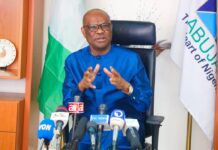By Chimezie Godfrey
The Federal government has unveiled a 5-year Strategic Roadmap for the Ministry of Humanitarian Affairs, Disaster Management and Social Development which spans from 2021-2025.
The document which contains humanitarian policies and ways of providing effective coordination of national and international humanitarian interventions was launched by the Vice President of the Federal Republic of Nigeria, Professor Yemi Osibajo on Monday, at the Banquet Hall, State House Abuja.
The Vice President who was represented by the Deputy Chief of Staff to Mr President, Adeola Rahman Ipaye said that the document was a veritable milestone in the Ministry of Humanitarian Affairs as well as President Muhammadu Buhari’s administration.
He stated that the launch of a Strategic Roadmap formulated by the ministry was essential to the coordination of all the Social security programes under its jurisdiction.
“I am further delighted by the Roadmap’s emphasis for establishing linkages with other government plans such as the National Development plan.
“By situating itself within the broader matrix of National planning, the Roadmap and by implication, the ministry is contributing to a climate of coherence, consistency and continuity across all spheres of governance.
“The Roadmap also rightly registers the importance of coordination across the federal, states and local governments, an outcome that is critical for driving real transformation.
“The roadmap itself will be effective only to the degree of its implementation, therefore, the federal government stands ready to support the actualization of this Roadmap every step of the way. I urge all stakeholders to close ranks and collaborate with the ministry in bringing us ever closer to a socially secured nation”.
Earlier, the Minister Sadiya Umar Farouq stated that the formulation of the Roadmap became imperative to serve as a guiding light towards fulfilling the ministerial mandate.
“The roadmap is the end product of the cohesive analysis of the valuable insights, feedback and inputs received from the Ministry’s departments and agencies.
“This Strategic Roadmap is aptly themed, ‘mapping out a life of dignity for all’ in line with the Ministry’s onerous task of effectively discharging responsibilities that are pivotal to the economy of the nation and the well-being the citizenry.
“The roadmap also introduced implementation, monitoring, evaluation, review and reporting mechanisms that will be deployed to ensure effective results delivery.
“These key performance indicators and performance tracking instruments will enable the Ministry to monitor its efficiency and measure implementation of the strategic roadmap over the five-year period 2021 – 2025.
“The full implementation of the strategic thrusts and the roadmap, while consolidating the Priority Areas of the Federal Government, will also guide us towards achieving the mandate of the Ministry, improving the lives of vulnerable Nigerians and mapping out a life of dignity for all”.
Other speakers and distinguished guests at the formal launch of the Strategic Roadmap of the ministry include the deputy Governor of Borno State HE Umar Usman Kadafur, the Minister of Finance Mrs Zainab Shamsuna Ahmed , Minister of Information and Culture Alhaji Lai Muhammed, Minister of State for Mines and Steels, Dr Uchechukwu Ogah, Minister of Industry, Trade and Investment Mr Adeniyi Adebayo, Chairman House Committe on Poverty Alleviation, Abdullahi Balarebe Salame, the UAE Ambassador to Nigeria H.E Dr Fahad Obaid Al Taffaq, the Permanent Secretary of the host ministry , Mr Bashir Nura Alkali, Heads of Parastatals and Directors of the ministry, Civil Society Organization, Representatives of the Service Chiefs and Persons with Disabilities Community, donors and partners.
The 7 Strategic Pillars that have been identified for the Ministry are as follows:
a.Strengthening Policies and Institutional Framework;
b. Building Evidence-Based Systems for Transparency and Accountability;
c. Enhancing Programme Delivery Through Effective Monitoring and Evaluation Mechanisms;
d. Optimizing Funding and Resourcing Opportunities;
e. Strategic Partnerships, Collaborations and Disability Inclusion;
f. Implementation of a Robust Humanitarian Coordination System for Improved Communication and Governance; and,
g. Mainstreaming of the Sustainable Development Goals (SDGs) and Integration of Social Initiatives and Investment Programmes.





